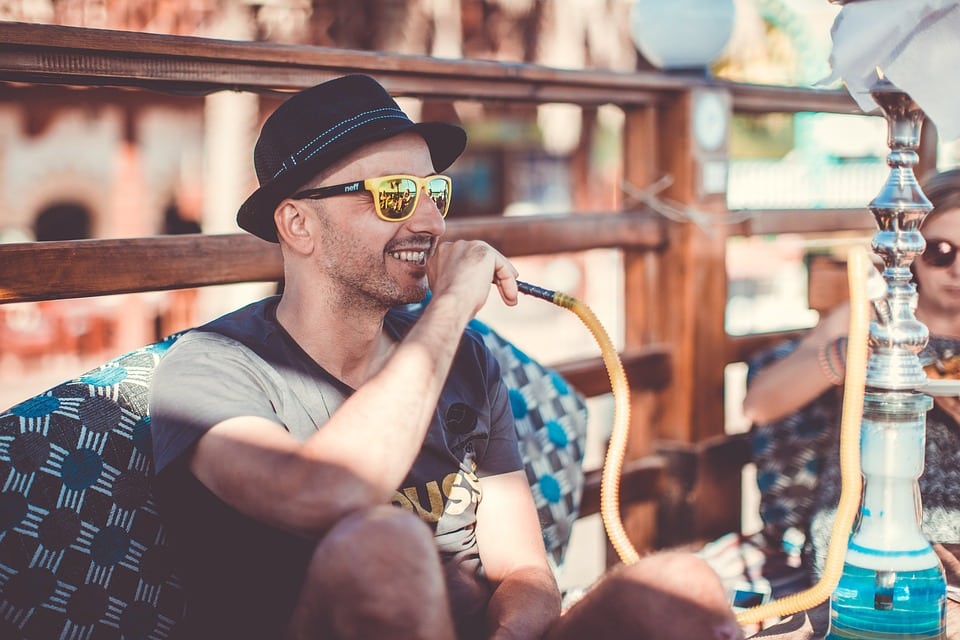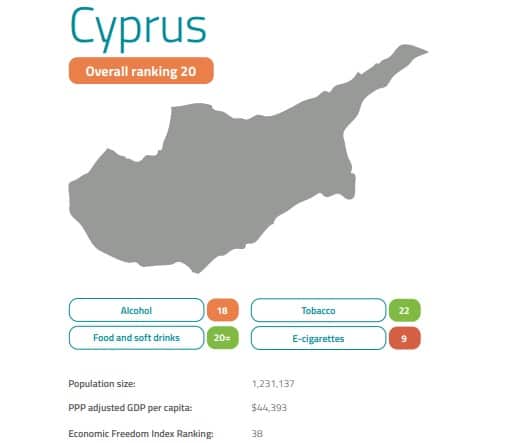By Jean Christou
Cyprus has been ranked 20th out of 30 countries in terms of ‘nanny state’ policies, meaning the island has not yet reached the level of a paternalistic interference but neither is it among the freest in Europe, according to a novel index published annually by a UK-based organisation.
The Nanny State Index, which is compiled by the NGO Institute of Economic Affairs (IEA) consists of three main categories: alcohol, nicotine, and diet, specifically sugary drinks, and focuses on the level of government control over these vices.
The index is designed to provide a league table of the best and worst places in Europe to eat, drink, smoke and vape. “The best ones are not great and the worst ones are terrible. Things are getting steadily less liberal nearly everywhere,” it concluded. The IEA describes itself as a ‘free market’ think tank and is often quoted in the UK media.
According to the 2023 index, the top ten ‘least free’ countries in that order were Turkey, Norway, Lithuania, Finland, Hungary, Ireland, Estonia, Latvia, Poland and Sweden.
This is followed by the ten ‘less free’ – the UK, Slovenia, France, Croatia, Netherlands, Romania, Denmark, Greece, Portugal and Cyprus, in 20th place.
The ‘freest’ countries ranked from 21 to 30, were Austria, Belgium, Malta, Bulgaria, Slovakia, Spain, Luxembourg, Italy, Czechia, and Germany, the 30th, and most free country on the list since the index was launched in 2016.
Countries are ranked out of 100. The lower the points, the more free they are. For instance, Germany scores 10 out of 100, Turkey is as high as 54 for its level of ‘nannying’, while Cyprus comes in with 21 points, which puts it almost in the ‘green zone’ but not quite.
“The Nanny State Index is like golf; it is better to have fewer points,” said the IEA’s head of Lifestyle Economics Christopher Snowdon.
The report says the island is liberal when it comes to food, soft drinks, and alcohol, but it “lets itself down with its treatment of vapers”, citing the 2017 imposition of an excise tax on e-cigarette fluid, even if the fluid does not contain nicotine. Cyprus also created a new category for heated tobacco products and taxed them at €150 per kilo, it added.
“Vaping was included in the draconian smoking ban that was narrowly passed in February 2017. Despite an amendment relaxing restrictions in ‘open areas’ – defined as spaces that have one open side – the smoking/vaping ban remains harsh,” the report says.
On the other hand, tobacco and e-cigarette advertising, though restricted to the point of sale, does not have a display ban. Alcohol advertising is largely permitted, although television and radio advertisements cannot air in the daytime.
Taxes on beer, spirits, and tobacco is low by EU standards, and Cyprus is one of 15 EU countries to have no wine duty. There is no sugar tax and no nanny state regulation of food, it added, and in 2022, the VAT on alcohol sold in bars was reduced from 19 per cent to 9 per cent. These were all pluses in the overall score.
“Putting together the Nanny State Index is always a dispiriting experience and this, the fifth edition, is the most depressing yet,” the report said.
Twelve of the 30 countries now have taxes on sugary drinks ranging from 7 cents to 30 cents per litre. In 2017, there were only five “not a bad rate of expansion for an anti-obesity policy that has never reduced obesity anywhere”.
Fifteen countries tax e-cigarette fluid – up from eight in 2017 – and two other countries ban the sale of e-cigarettes outright.
“Governments looking to reduce their fiscal deficits after the pandemic have found common cause with ‘public health’ extremists who promote sin taxes. Most of the taxes on sugary drinks also apply to artificially sweetened beverages, thereby giving the game away that this is a money-making scheme for governments,” said the report.
“The big picture is one of a constantly expanding nanny state raising prices and trampling freedom. The blame for this lies mainly with domestic governments, although the European Union is always keen to interfere,” it added.
According to the IEA, coercive nanny state policies create a number of problems and costs. It said that ‘sin taxes’ raise the cost of living and hurt the poor, high prices fuel the black market and lead to corruption while bans restrict competition and stifle innovation, create excessive bureaucracy and drain police resources.
Nor was there a correlation between tobacco control scores and lower smoking rates or between alcohol control scores and lower rates of alcohol consumption, it added. By contrast, it said there was a strong relationship between health and wealth showing the relationship between life expectancy and economic prosperity as measured by median incomes. “This suggests that pursuing economic growth would bring much greater benefits to health than coercive efforts to control personal behaviour with bans and taxes”.








Click here to change your cookie preferences